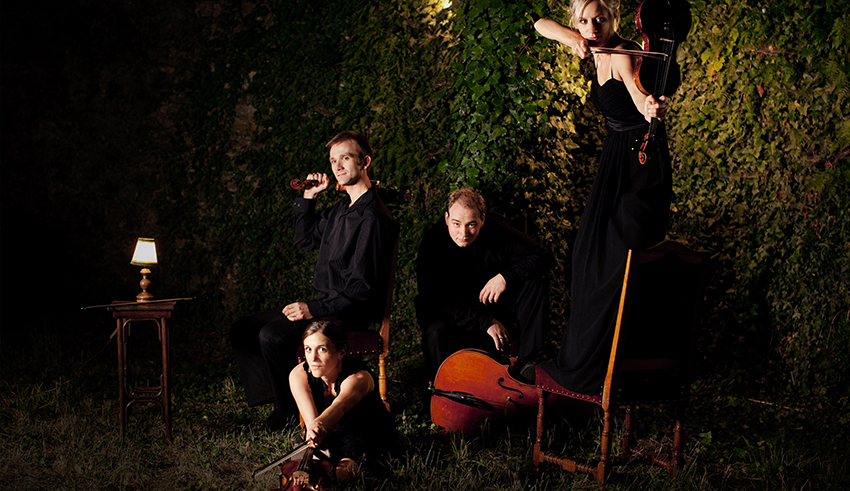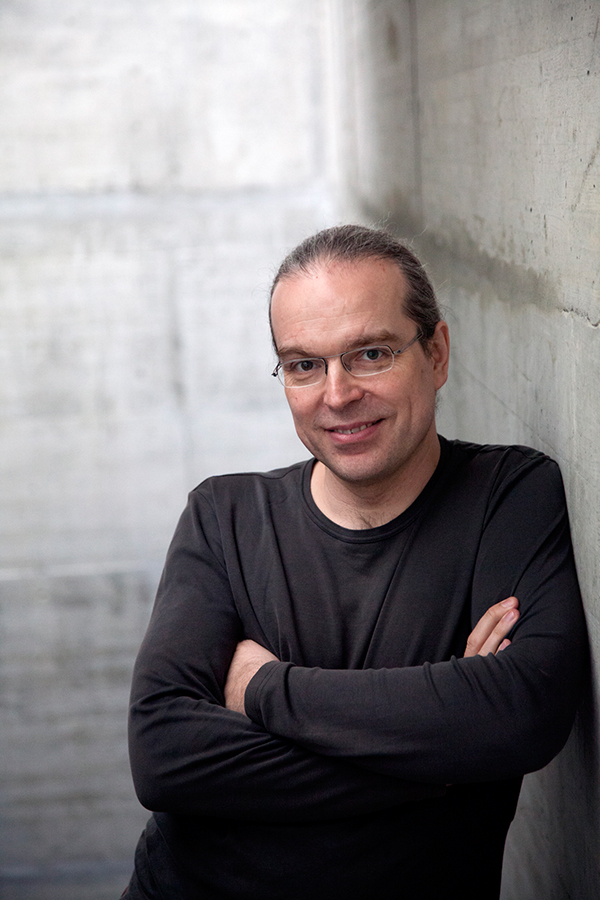It’s with a very special sound experiment that Wien Modern, in cooperation with the mdw, will once again be traveling unconventional paths—in keeping with this year’s festival motto of “The ultimate questions: Where do we come from? Where are we going? And where the devil are we now, anyway?”

Dmitry Shostakovich (1906–1975) is considered one of Russia’s most productive and versatile 20th-century composers. At the age of just 19, his 1st Symphony made him world-famous. And over the course of his life, he would compose 15 symphonies and 15 string quartets as well as numerous works in a diverse range of genres including film soundtracks, choral music, and music for the stage. Now, Wien Modern is planning the firstever simultaneous performance of all 15 of his string quartets in the same concert hall. Under its new artistic director Bernhard Günther, this festival for contemporary music is daring to conduct an experiment that takes up the—by no means new—tradition of musical collage: as early as 1753, in fact, the young Joseph Haydn encouraged other musicians to join him on Tiefer Graben in Vienna, spread out along the street, and play whatever they felt like playing at the moment.¹
Wien Modern will have 15 string quartets—including five from the mdw – University of Music and Performing Arts Vienna—appear in the Great Hall of the Vienna Konzerthaus to perform all 15 quartets by Shostakovich at the same time, sometimes in synch and sometimes individually. This concert’s dramaturgical concept aims to create a variety-packed listening experience for the audience, which will be free to quietly move throughout the concert hall (the seating of which will be removed for the evening). The timing of the various entrances according Bernhard Günther’s own concept will be rehearsed beforehand—but the quartets’ respective interpretations will be entirely free, with no conductor in charge.

Johannes Meissl, of the Joseph Haydn Department for Chamber Music, Early Music, and Contemporary Music, will select five ensembles from the mdw to participate in this exciting project: “When Bernhard Günther told me about this project, I was immediately fascinated by the idea. To me, and from an aesthetic standpoint, this ‘sound cloud’ is something like a radical continuation of Gustav Mahler and Charles Ives.” So Haydn’s appeal to his friends can most certainly be seen as a foreshadowing of what, later on, Charles Ives sought to achieve with his collages. “This simultaneous, multi-layered quality is something we all know from everyday life, but it also has a long tradition as one of many aesthetic strategies of contemporary music,” says Günther. “And in selecting the ensembles, we looked not only for strong Shostakovich interpretations but also for the proper concentration and coolness that are needed for the far more ‘contemporary’ density and simultaneity that will arise in this situation, with 14 other quartets in the same hall. Because while some of them will be placed as far apart from each other as possible, other quartets will be positioned back-to-back,” continues the festival head. The spatial and musical centre of the performance will be Shostakovich’s final and longest string quartet: it will be interpreted by the Arditti Quartet, which was founded in 1974 and has been heard at Wien Modern practically every year since the festival’s founding 29 years ago. Directly beside them will be New York’s JACK Quartet with the 14th String Quartet, and another three quartets each will be drawn from Hamburg’s Ensemble Resonanz and the soloist-ensemble Kaleidoskop from Berlin. The selection of the mdw’s five quartets was left up to the university, with full trust placed in Professor Meissl. Alongside student ensembles that are already successful internationally, such as the Giocoso Quartet (which won several awards at the 2015 Melbourne International Chamber Music Competition), the equally successful Adamas Quartet, and Quatuor Akilone from Paris (winner of the 2016 Bordeaux Competition), the mdw has also chosen the Doreen Quartet and the Atalante Quartet. And in addition to the mdw ensembles, two quartets from the MUK (Music and Arts University of the City of Vienna) will also be participating. “This will be more than just a new listening experience for the audience: it will also be an entirely new playing experience for the participating ensembles,” says Johannes Meissl. Bernhard Günther elaborates: “Alongside ‘solo’ moments where just one of the many quartets in the hall will be heard, there will also be periods when—depending on where you’re standing—one quartet nearby will be heard very clearly while others will only be heard off in the distance, and there will also be dense moments of simultaneity in which the entire hall will be filled with playing string quartets.”
The festival’s new artistic director considers Dmitry Shostakovich to be among the main points of reference in 20th-century quartet literature. “Regardless of whether one likes his music, his quartets play a more prominent role in the repertoires of numerous institutions and ensembles than those by most others from this period. Some will ask themselves why this is being programmed at Wien Modern, as well—perhaps because they don’t consider Shostakovich to be contemporary enough. But this approach to him most definitely is! These works are characterised by a certain robustness, featuring long passages with repetitions, striking solos, highly dramatic fortissimo outbursts, and an inherently high pressure; if they were at the opposite extreme—very fragile, complex, introverted compositions constantly on the verge of silence—I’d be less prone to trying this kind of experiment.” After all, it was the very fact that Shostakovich seems to be constantly wrestling with existential questions in his quartets that inspired this simultaneous performance. “In this quasi-private genre of the string quartet,” says Günther, “he was less closely observed by the state apparatus and its censors than in his symphonies, which always had a more strongly representative quality to them.” Altogether, this year’s festival programme features an especially high number of string quartets, with the abovementioned “ultimate questions” accounting for the stronger focus on this intimate genre. Altogether, 19 different string quartets will be coming to the festival to perform—and alongside the works by Shostakovich, quartets by composers including Arnold Schönberg and Harrison Birtwistle will also be heard.
In preparing for 11 November 2016, the involved ensembles are attempting above all to realise autonomous interpretations of their respective quartets. And this single evening concert is to present a sweeping survey of four eventful decades in Shostakovich’s life—from 1938 to 1974. So “those attending are invited to give themselves over completely, with their eyes and their ears, to this overall sound event,” concludes Meissl in eager anticipation of this exceptional evening.
¹ Neuwirth, Olga. Neuwirth über Haydn. Erschienen im profil 14/09

